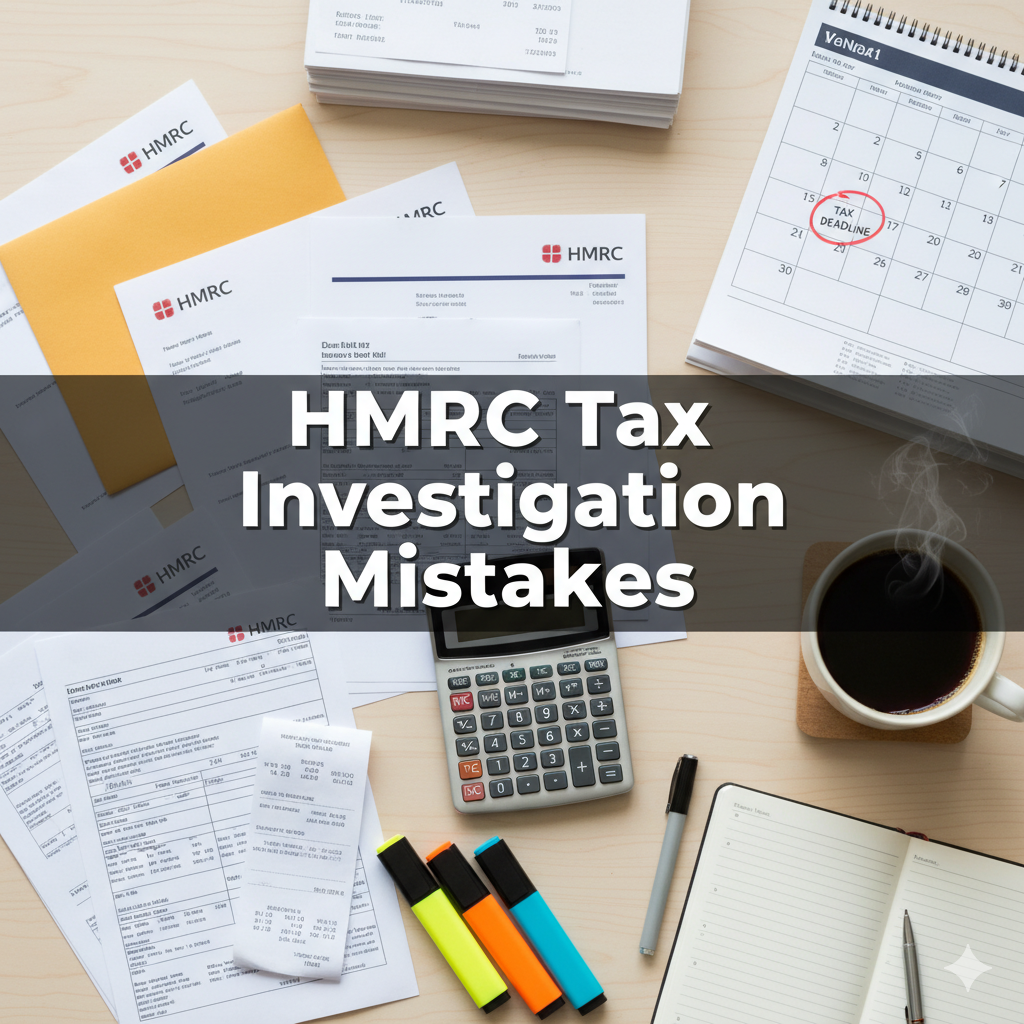
Here’s something they don’t tell you at dinner parties: HMRC opened over 31,000 tax investigations last year. That’s roughly 85 people waking up every single day to a brown envelope that makes their stomach drop. And here’s the kicker—most of them made the same handful of mistakes that turned a routine enquiry into a financial nightmare.
I’ve watched clients lose sleep, relationships, and sometimes their businesses over HMRC tax investigation mistakes that were entirely preventable. We’re not talking about people trying to hide money in offshore accounts or running elaborate schemes. Just ordinary business owners and individuals who thought they were doing things right.
Why Your “It Won’t Happen to Me” Attitude Is Dangerous
Look, I get it. You file your self-assessment returns, you keep receipts, you’re hardly Pablo Escobar. But HMRC’s algorithms don’t care about your intentions—they care about patterns, discrepancies, and red flags you might not even know you’re waving.
The revenue service has become frighteningly good at spotting anomalies. Machine learning systems cross-reference your tax returns against industry benchmarks, lifestyle indicators from public records, and data from third parties. It’s not personal. It’s just… relentless.
And when they come knocking? That’s when the HMRC tax investigation mistakes start piling up faster than unread emails on a Monday morning.
The Panic Response (And Why It Backfires Spectacularly)
First contact from HMRC triggers something primal in most people. Flight or fight. Except in this case, both responses land you in deeper trouble.
Ignoring correspondence? Congratulations, you’ve just transformed a standard enquiry into a full-blown investigation. HMRC interprets silence as evasion, and they’re not entirely wrong to think that way. Every day you don’t respond is another day they’re building a case file with your name on it.
But rushing to respond without proper preparation is equally catastrophic. I’ve seen people:
- Admit to “mistakes” that weren’t actually mistakes (HMRC loves this one)
- Volunteer information that wasn’t requested (why give them ammunition?)
- Make contradictory statements because they’re panicking
- Accept penalties they could have challenged successfully
The sweet spot? Acknowledge receipt promptly, but don’t provide substantive responses until you’ve got your ducks in a row. And by ducks, I mean records, advice, and a clear strategy.
The “I’ll Just Handle This Myself” Trap
There’s a particular breed of business owner—usually successful, often slightly stubborn—who believes they can navigate an HMRC investigation alone. They’ve built a company from scratch, after all. How hard can dealing with a few tax questions be?
Monumentally hard, as it turns out.
Tax law isn’t intuitive. It’s not even particularly logical sometimes (VAT on Jaffa Cakes but not regular cakes, anyone?). HMRC investigators are specialists who do this daily. You’re bringing a plastic spoon to a knife fight.
Real-world casualty: A client once tried handling their own enquiry into Construction Industry Scheme deductions. They misunderstood one question about subcontractor verification, gave an answer that contradicted their original filing, and ended up with £18,000 in penalties. All because they wanted to save a few hundred quid on professional fees.
Professional representation matters. Not because accountants have magic powers, but because we know the language, the procedures, and—crucially—what HMRC is actually asking for versus what they appear to be asking for. At Ask Accountant, we handle everything from straightforward enquiries to complex investigations involving CIS claims and business accounting irregularities. We’re based at 178 Merton High St, London SW19 1AY, and honestly? Half our job is stopping clients from making HMRC tax investigation mistakes that would haunt them for years.
Document Disasters: When Your Records Tell the Wrong Story
Let me paint you a scenario. In HMRC asks for your business expense records. You think, “No problem, I’ve got receipts.” Then you realize:
Half are faded beyond recognition. A quarter are for things you can’t remember buying. Some are definitely personal expenses that somehow wandered into the business pile. And that expensive client lunch? You’ve got the receipt but absolutely no recollection of who attended or what was discussed.
Sound familiar?
Poor record-keeping is one of the most common HMRC tax investigation mistakes—it’s interpreted as evidence of carelessness at best, deliberate obfuscation at worst.

What “Adequate Records” Actually Means
Forget what you think is reasonable. Here’s what HMRC expects:
| Record Type | Retention Period | Common Mistakes |
|---|---|---|
| Sales invoices & receipts | 6 years (5 years + current) | Digital copies only without backup, illegible scans |
| Purchase invoices | 6 years | Missing VAT details, incomplete supplier information |
| Bank statements | 6 years | Gaps in consecutive months, unexplained transactions |
| Payroll records | 6 years | Incomplete RTI submissions, missing P11D forms |
| Mileage logs | 6 years | Estimated rather than actual, no business purpose noted |
| Asset registers | 6 years from disposal | No purchase dates or depreciation records |
Notice anything? Six years is the magic number. Not five. Not “however long feels right.” Six full years plus the current tax year.
But here’s what really trips people up: it’s not enough to have the records. They need to be organized, coherent, and tell a consistent story. HMRC investigators are looking for patterns. When your records are chaotic, they assume there’s something to hide in that chaos. Professional bookkeeping services prevent exactly this problem.
The Estimation Game You Cannot Win
Missing some records? Your first instinct might be to estimate. After all, you’ve got a rough idea of what you spent on office supplies, right?
Stop right there.
Estimates are kryptonite during tax investigations. HMRC views them as educated guesses at best, fabrications at worst. And here’s the truly painful part—if they suspect you’re estimating, they’ll make their own estimates. Except theirs will always, always be less favourable than yours.
I’ve watched investigators disallow 100% of claimed expenses in categories where clients couldn’t provide adequate documentation. Not reduce them proportionally. Disallow them entirely. Then add penalties for careless behaviour.
Better approach: If records are genuinely missing, use bank statements to reconstruct transactions. Cross-reference with supplier statements. Check email confirmations. Build evidence from multiple sources rather than plucking numbers from thin air. It takes longer, but it stands up to scrutiny.
The Disclosure Dilemma
Here’s where things get psychologically tricky. You’ve discovered an error in previous tax returns. Maybe you forgot about some freelance income. Perhaps you claimed expenses that weren’t entirely business-related. What do you do?
The instinct for many is to keep quiet and hope HMRC doesn’t notice. This is one of the most dangerous HMRC tax investigation mistakes you can make.
HMRC runs disclosure facilities precisely because they know people make mistakes. Come forward voluntarily, and you’ll face smaller penalties (or none at all for genuine errors). Get caught during an investigation, and penalties can reach 100% of the tax owed—sometimes more if they suspect deliberate concealment.
But—and this is crucial—how you disclose matters enormously. Timing, phrasing, and the level of detail can mean the difference between a slap on the wrist and a financial catastrophe.
When Honesty Becomes Oversharing
There’s being cooperative, and then there’s being your own worst enemy. Some people, in their eagerness to appear helpful, volunteer information about issues HMRC hasn’t even asked about. It’s like being pulled over for a broken taillight and immediately confessing to every time you’ve ever gone slightly over the speed limit.
Answer what’s asked. Provide what’s requested. Be accurate and truthful. But for heaven’s sake, don’t conduct their investigation for them.
The Timeline Trap
HMRC sends an information request with a deadline. You think, “Great, I’ve got four weeks.” Wrong thinking. Here’s what actually happens:
Week 1: You read the letter, feel stressed, put it aside to deal with “when you’re less busy.”
Week 2: You remember the letter, panic slightly, start gathering documents.
Week 3: Realize you’re missing crucial records. Try to reconstruct them.
Week 4: Rush everything together, miss important details, submit incomplete or contradictory information.
Rushed responses contain errors. Errors raise suspicions. Suspicions extend investigations. Extended investigations cost more money and cause more stress. It’s a vicious cycle.
Start immediately. Even if you can’t complete everything straight away, at least understand the scope of what they’re asking and identify potential gaps in your records. Our tax compliance services include deadline management precisely because we know how quickly time disappears.
Penalty Mitigation: The Art You’re Probably Ignoring
Most people focus entirely on the tax owed and forget about penalties. Big mistake. Penalties can dwarf the original tax liability.
But here’s something most taxpayers don’t realize: penalties are negotiable. Not in a haggling-at-a-market sense, but through something called “reasonable excuse” and “special circumstances” provisions.
| Behaviour Category | Standard Penalty Range | With Quality Disclosure |
|---|---|---|
| Reasonable care but error | 0% | 0% |
| Careless (failure to take reasonable care) | 0% – 30% | Reduced significantly |
| Deliberate but not concealed | 20% – 70% | Can drop to 20% |
| Deliberate and concealed | 30% – 100% | Can drop to 30% |
The range within each category depends on three factors: whether you told HMRC about it, how much help you gave them, and how quickly you gave them access to information. This is called the “quality of disclosure.”
I’ve helped clients reduce penalties from £25,000 to £3,000 simply by demonstrating they had reasonable excuse (serious illness during the tax year, bereavement, business crisis) and by making a high-quality disclosure. But this requires strategy, documentation, and understanding how HMRC’s penalty framework actually works.

The Settlement Scramble
Eventually, investigations reach a conclusion. HMRC proposes a settlement figure. And this is where even sophisticated business people make catastrophic mistakes.
Many assume the settlement is final, fixed, immutable. It’s not. It’s an opening negotiation position. HMRC expects you to challenge it if you have grounds to do so.
Common mistakes at settlement stage:
- Accepting the first figure offered without reviewing their calculations
- Not requesting a breakdown of how they arrived at their numbers
- Failing to challenge penalties when there are grounds for reduction
- Missing the appeal deadline (30 days—it’s strict)
- Not obtaining independent review of the settlement proposal
Ask Accountant handles complex tax advisory solutions including settlement negotiations. Ring us on +44(0)20 8543 1991 if you’re facing a proposed settlement that doesn’t feel right. Sometimes a phone call from a professional can shift HMRC’s position significantly.
When Alternative Dispute Resolution Makes Sense
Most people don’t know this exists. HMRC offers Alternative Dispute Resolution (ADR)—basically mediation—for certain tax disputes. It’s free, faster than tribunals, and surprisingly effective.
But you have to request it explicitly, and timing matters. Wait too long, and they’ll say you’ve missed the window. Request it too early, and they’ll say the issue isn’t crystallized enough.
ADR works best when there’s genuine disagreement about technical interpretation rather than straightforward factual disputes. Things like whether a particular expense is wholly and exclusively for business purposes, or how to value a benefit in kind.
The Psychological Toll Nobody Mentions
Let’s talk about something that doesn’t appear in HMRC manuals: what investigations do to your mental health.
I’ve had clients develop insomnia. Others report relationship strain because they’re constantly distracted and stressed. Some experience genuine anxiety symptoms—racing heart when post arrives, constant worry about worst-case scenarios.
Tax investigations aren’t just financial events. They’re deeply personal intrusions that make you feel suspected, judged, and vulnerable. This emotional dimension is why people make HMRC tax investigation mistakes—they’re not thinking clearly.
If you’re going through an investigation:
- Set boundaries (don’t check emails about it after 7pm)
- Delegate the technical work to professionals
- Remember that an investigation isn’t a moral judgement
- Keep perspective—it’s financially significant but it’s not life-threatening
Easier said than done, obviously. But maintaining some emotional distance helps you make better decisions.
Future-Proofing Against Investigations
Once you’ve survived an HMRC investigation (and you will survive it), you never want to go through it again. Prevention becomes paramount.
Here’s what actually works:
Implement systems, not just habits. Don’t rely on remembering to scan receipts—create a process where it happens automatically. Use cloud accounting software that reconciles daily. Set calendar reminders for tax deadlines with two-week buffers.
Get your bookkeeping professionally reviewed quarterly. Don’t wait for year-end to discover you’ve been miscategorizing expenses for months. Proactive business accounting services catch errors when they’re easy to fix. We offer exactly this at Ask Accountant—regular health checks that identify issues before they become problems.
Understand what triggers investigations. Certain things attract attention: round numbers on tax returns (too neat), significant year-on-year changes without explanation, expense ratios far outside industry norms, lifestyle inconsistent with declared income.
Keep business and personal finances completely separate. Shared bank accounts are a gift to investigators looking for undeclared income. Use separate cards, separate accounts, separate everything.
Particularly relevant for contractors: If you’re claiming CIS refunds or handling auto-enrolment for staff, errors in these areas are investigated aggressively because they’re known fraud vectors. Getting specialist advice on CIS claims and payroll compliance isn’t optional—it’s protective.
The Questions You’re Afraid to Ask
What if I genuinely can’t pay what HMRC says I owe?
Time to Pay arrangements exist. HMRC would rather receive payment gradually than bankrupt you and get nothing. But you need to propose something realistic and demonstrate you’re not hiding assets.
Can HMRC access my bank accounts without telling me?
Yes, through something called a Third Party Notice. They can request information from banks, building societies, even PayPal. Usually they’ll tell you, but not always.
What happens if I’ve made a mistake on my inheritance tax return?
Inheritance tax investigations are particularly stressful because they happen during bereavement. Penalties still apply for errors, but reasonable excuse provisions are applied more sympathetically if you can demonstrate the circumstances. Professional inheritance tax advice during estate administration prevents most issues.
If I disagree with HMRC’s findings, what’s my next step?
Request a statutory review first (free internal review), then appeal to the First-tier Tribunal if necessary. But be realistic—tribunals are expensive and stressful. Settle if you can.
Can HMRC investigate years that are supposedly “closed”?
Usually they can go back four years. But if they suspect carelessness, it’s six years. If they suspect deliberate behavior, it’s 20 years. There’s no statute of limitations on fraud.
Working With Professionals Without Losing Control
Some clients hand everything over to accountants and disengage completely. Others micromanage every email and question every decision. Neither approach is ideal.
Your accountant should handle technical aspects, correspondence with HMRC, and strategy. But you need to stay informed, make key decisions, and provide information promptly when requested.
It’s collaboration, not abdication. Our business advisory approach keeps you informed at every stage while handling the heavy lifting.

Facing an HMRC Investigation?
Look, nobody wants to be in this position. But now that you’re here, making the right moves matters enormously. Whether you’re dealing with enquiries about business expenses, Construction Industry Scheme refunds, VAT discrepancies, or something more complex, having experienced support makes all the difference.
At Ask Accountant, we’ve guided hundreds of clients through tax investigations—from initial letters through to successful settlements. We handle all aspects of business advisory, bookkeeping, tax advisory solutions, and business growth planning. Sometimes the best investment isn’t in growing your business; it’s in protecting what you’ve already built.
Give us a call at +44(0)20 8543 1991 or visit us at 178 Merton High St, London SW19 1AY. Initial consultations are straightforward—we assess your situation, explain your options, and let you decide how to proceed. No pressure, just clear advice when you need it most.
Final Thoughts on Avoiding the Worst
HMRC tax investigation mistakes aren’t inevitable. They’re the result of panic, poor advice, inadequate records, or simply not knowing how the system works.
The investigation itself might be stressful, but it doesn’t have to be financially devastating. Most cases settle for reasonable amounts when handled properly. It’s the mishandling that creates disasters.
Keep decent records. Respond promptly but thoughtfully. Get professional help early. Don’t make admissions you can’t support. Understand your rights and the process. And remember—HMRC investigators are people too, following procedures. They’re not out to destroy you personally; they’re out to collect tax they believe is owed.
Approach investigations methodically, not emotionally. That alone will save you thousands.
For more guidance on avoiding common tax pitfalls, check out our tax-busting checklist or read about how to avoid tax mistakes before they happen.







